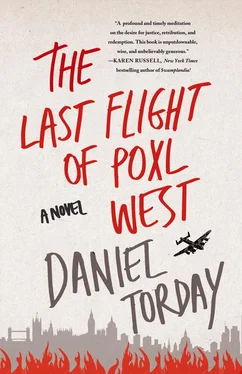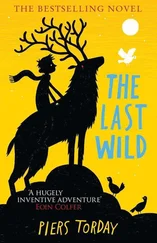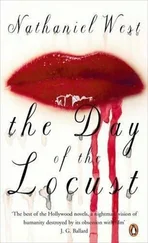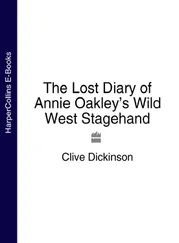“I was,” I said.
“You weren’t even thinking of what she must have thought when she found you gone.”
“I wasn’t.”
We both sat back in our chairs and looked at each other. Niny took up the newspaper I’d brought home. I could see that she wanted to continue, to bring home to me what I’d done, but that she could tell how distraught I was already.
“Half the city’s buildings destroyed in one day,” she said. “That’s not half the people, Poxl. It’s buildings. Two wholly different things.” As she spoke I watched the motes in the slanting light. “You’ll wait to see if you get a letter back. Meantime, you’ll have no choice but to continue on.”
There was a sound at the door. Johana had returned. She looked in on us but didn’t say anything. Niny left me alone, too, after kissing me on the forehead. I heard Johana in the kitchen opening cabinets and closing them. Not long after she’d started banging around in there I caught whiff of a smell so familiar that it carried with it memories: my mother’s face; amber earrings clacking against each other; the thin fog of cloud as it surrounded my head in my father’s small propeller plane; the dark purple outline of Radobyl in the near distance. Johana came into the room with a plate of fried cheese. She put it down in front of me.
Smazeny syr.
During the weeks that followed I heard on the radio that Holland had capitulated before the Luftwaffe had begun bombing — the queen had, like me, fled to London. The last few Dutch pilots turned west and kept right on flying across the North Sea until they, too, landed on British soil. It was as if everyone in Rotterdam was absconding for the UK. Still no word came from the Brauns, and no word from Françoise, either. Perhaps now she didn’t even want to hear from me. It had felt powerful, the regaining of some propriety, leaving for London when I had. Now I was entirely powerless even to know what Françoise was thinking — if she was even alive.
My mind was given over to thoughts of flying. Each BBC report of the overwhelming power of the Luftwaffe made me think of the planes I’d flown with my father outside of Prague.
A new idea set in for me.
I could fly.
It was a matter of figuring out how to enlist.
There in London, Churchill took over. The next week, 300,000 British soldiers evacuated Dunkirk. Londoners settled into routines. Those with means sent their children out of the city for fear of bombings. I rode my bicycle up to Downing Street and watched as buildings on Whitehall were plied with sandbags. Soldiers put up Browning machine guns. We were lucky to have the freedom to observe it: Many of the Jews who had arrived from points east were now being detained in refugee camps on the Isle of Wight. But since Johana and Niny had established themselves, we were lucky to be spared that burden.
3.
One morning in early June a pamphlet came to our door. It was entitled What Can You Do if the Invasion Comes? I arrived at a section entitled “How to Protect Oneself While Walking About,” then this pair of sentences:
“In Holland, Dutch soldiers were gunned down in the streets by German soldiers. Be certain to have your wits about you, and if you see your own soldiers engaged in battle, do steer clear of them.”
And so I took to the streets of central London to seek out an enlistment office. If it wasn’t hard enough for me to get around this new city already, street signs had been removed now, so if a German attack accompanied an invasion, the soldiers would have a hard time navigating London. Pillboxes went up all around the city disguised as huts or petrol stations. They disoriented me, obfuscating the few landmarks I’d come to recognize. I rode my bicycle across London Bridge and applied for work with the Civil Defense Department. There was a limited amount I could do in the active war effort as a refugee.
By mid-August, when I stopped, as I did every day, to check in with the Civil Defense Department, I was offered a job driving a mobile canteen. This was not yet joining the RAF. Driving a truckful of potables was not countering Luftwaffe planes. But it was a first step.
My Czechoslovak passport declared me Class C, “friendly alien,” and though back at the end of May, Churchill had had all the Austrian and German refugees interned, I was hired. My canteen was a Chevrolet truck donated to Bermondsey by the people of the American city of Chicago. In the bed of this truck was a small superstructure we would load up with food and drive out to the Home Guardsmen and the ack-ack operators, who had yet to fire their flak at Luftwaffe planes.
My first week at the job, I was partnered with Clive Pillsbury, a lank Brit in his mid-twenties. His face was blanched save for scattered freckles across his nose and the upper parts of his cheeks. He had the face of a teenager, the manner of a much older man, and he was possessed of a gravity and wit that made him a welcome companion.
That first day we went out together on the streets of London I was forced to depend upon him for directions. I studied the city maps, marking the main avenues, but I was hopeless. “This right here on Oxford Street — no, right, make a right,” Clive would yell. “A left here. Poxl, a left, my boy. Oh, we’ve missed it again, then. Mightn’t we consider trying to find another driver?”
I looked at him.
“I know, I know, my license and all. But it will be something if we’re able to get there. And now — there — no, you’ve missed it again.”
“Why don’t you have the wheel yourself?” I asked.
He didn’t respond, only turned a bright red at the skin above his collar.
“Drive on, then,” he said.
I had been told by our dispatcher that Clive had lost his license after driving the better part of the previous year, all throughout the Phoney War, until an unfortunate drunken incident left him unable to drive. I hadn’t learned what kept Clive from driving, but I assumed I was better off not pushing it. The subject of driving was a sore one for irascible Clive.
While I became inured to our paths across London, we found ourselves circling neighborhoods. British planes were fighting the Luftwaffe on the coast, and our charge gained urgency. Where wounded soldiers had been spotted returning through Waterloo Station after Dunkirk end of May, now homeless suburbanites trickled into the city for respite.
“We shall get used to it in time,” people would say. “Business as usual.”
At night a pink glow rose from the southeast. Bombs hadn’t yet fallen on London proper. In the evenings, Clive and I would drink. Clive’s self-control in the public houses made the story I’d heard about him losing his license even more suspect. He was completely self-possessed. His secret to holding his liquor: Every three pints of bitter, he would drink a cup of coffee — ersatz coffee, amid rationing, but it was a drink he preferred to the tea his fellow Brits commonly drank. I took to having a cup myself amid all the drinking, coming to like the rectitude implied by such routine.
4.
When we heard the sound of the air raid siren at home — the sound of a couple hundred banshees all letting their voices cry upward and downward to signal that bombers were soon to be overhead — we dropped what we were doing and huddled in the Anderson shelter out back. It brought me and my cousins a new closeness, an ease like we’d had back in Leitmeritz. And something new. We would sit together, imagining this could be our last moment on earth. And something changed in us. Johana would let her fingers grip mine while her other hand gripped Niny’s. We weren’t children, cramped together in a tiny metal shelter, awaiting Luftwaffe bombs. We weren’t adults, either. We were three cousins pressed together, not knowing what would come next, unable to predict what the next second held for us.
Читать дальше












